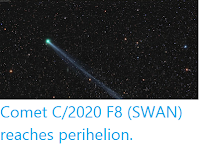Comet C/2020 F3 (NEOWISE) reaches its perihelion (the closest
point
on its orbit to the Sun) at 4.20 pm GMT on Friday 3 July 2020, when it will bet
approximately 0.29 AU from the Sun (i.e. 29% of the distance between
the
Earth and the Sun, and some way inside the orbit of Mercury). At
this time the comet will be 1.22 AU from the Earth, in the
constellation of Taurus, having a magnitude of 2.00, making it potentially naked-eye visible, although the closeness to the Sun means that it will be visible only shortly before dawn and/or after dusk (depending on geographical location on Earth).
Comet C/2020 F3 (NEOWISE) imaged on 10 June 2020 from Swan Hill in Victoria, Australia. Stars in the background are slightly elongate due to the two minute exposure used to get the image. Michael Mattiazzo/Seiichi Yoshida's Comet Page.
Comet C/2020 F3 (NEOWISE) was discovered on 27 March 2020 by the NEOWISE system on the Wide-field Infrared Survey Explorer satellite. The designation C/2020 F3 (NEOWISE) implies that it is a comet (C/), that
it was the third comet-like body (3) discovered in the second half of March 2020 (period 2020 F - the
year being split into 24 half-months represented by the letters A-Y, with I being excluded), and that it was discovered by the NEOWISE system.
The orbit and current position of C/2020 F3 (NEOWISE). The Sky Live 3D Solar System Simulator.
C/2020 F3 (NEOWISE) has an estimated orbital period of 6765 years and a
highly eccentric
orbit tilted at an angle of 129° to the plain of the Solar System, that
brings it to 0.29 AU from the Sun at perihelion (29% of the distance
between the Earth and the Sun);
to 715 AU from the Sun at aphelion (715 times as far from the Sun as
the Earth or 24 times as far from the Sun as the planet Neptune, and some way beyond the Kuiper Belt). As such it is considered to be a Long Period Comet (comet with a period of over 200 years).
See also...
See also...
Follow Sciency Thoughts on Facebook.








